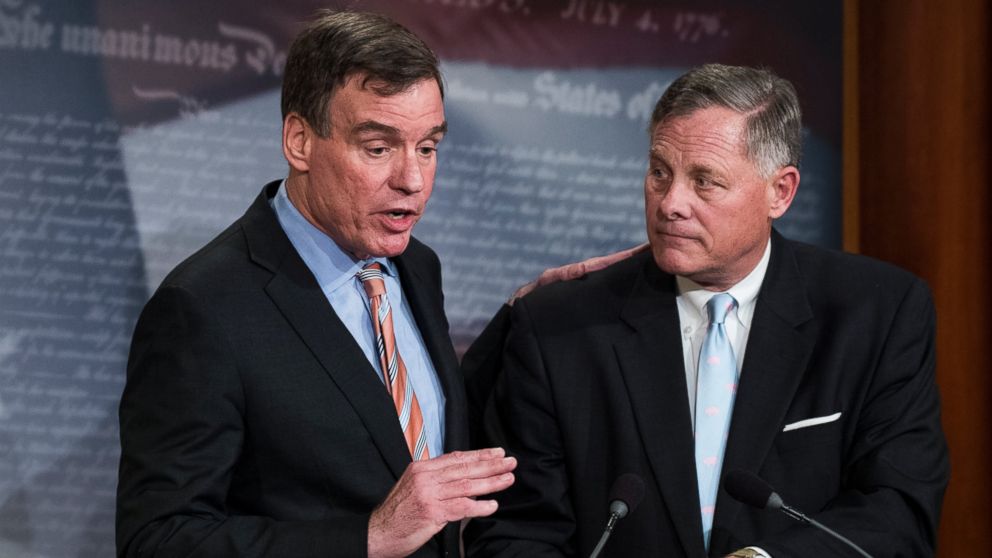How the House, Senate Russia probes are headed down different paths
— -- It appears to be a tale of two Russia investigations.
There is the probe by the House Intelligence Committee that has been publicly marred by controversy over the actions of its chairman, Devin Nunes, R-Calif., once a member of the Trump transition team, and his wrangling with its ranking member, Adam Schiff, D-Calif.
Then there is the Senate, where, by contrast Wednesday, the leaders of that body's Intelligence Committee presented a united front as they shared details of their ongoing inquiry into Russian interference, including possible collusion with a campaign, and vowed to "get to the bottom of this."
The probes, which are running simultaneously with an FBI investigation into possible collusion between Trump associates and Russian officials, represent a critical juncture in the nascent administration.
The investigations have split lawmakers largely along party lines, with the GOP homing in on leaks of classified information and the unmasking of Americans in collected surveillance and Democrats emphasizing Russian meddling in the presidential election.
Chairman Richard Burr, R-N.C., and Vice Chairman Mark Warner, D-Va., appeared together at a Capitol Hill press conference Wednesday and defined the scope of the Senate committee's work.
"An outside foreign adversary effectively sought to hijack our most critical democratic process, the election of a president, and in that process, decided to favor one candidate over another," said Warner. "We're here to assure you and, more importantly, the American people who are watching and listening, that we will get to the bottom of this."
"This is one of the biggest investigations that the Hill has seen in my tenure here," said Burr.
Warner's invocation of his and Burr's long-standing working relationship during their appearance and shared "concern about what the Russians have done and continue to do around the world" stood in stark contrast to the fracture at the top of the House Intelligence Committee, where Nunes is being questioned about his impartiality, willingness to share information and methods in acquiring intelligence.
Since it was revealed Monday that Nunes traveled to the White House grounds last week in order to meet with a source who provided him with information that Americans were swept up in foreign surveillance efforts — about which he later briefed the press and the president before consulting his committee — a number of congressional leaders, including one Republican, have called for him to recuse himself from the investigation.
Nunes has refused to do so — a stance backed by Speaker of the House Paul Ryan. Ryan admitted Thursday though that the situation has "gotten a little political."
On Tuesday, Nunes canceled all of this week's House Intelligence Committee meetings. The next day he said his committee has to hear from FBI Director James Comey and National Security Agency Director Mike Rogers behind closed doors before the investigation may proceed, but a committee spokesperson said Schiff wouldn't sign the letter inviting Comey back to the Hill.
Schiff told CNN he expected to meet with Nunes on Thursday. "We do need to get to the bottom of it. Otherwise, there will be this permanent cloud hanging over our investigation," he said.
The intelligence leaders on the Senate side gave no indication Wednesday that they are facing any of the same cooperation difficulties. Burr — an adviser on Trump's campaign who said his Intelligence Committee work "overrides any personal beliefs that I have or loyalties" — ticked off a long list of steps the committee is taking in its probe, including 20 interview requests that "may turn into private and public hearings."
"The staff has been provided an unprecedented amount of documents," said Burr. "Those documents include documents that, up to this point, have only been shared with the Gang of Eight [party and intelligence committee leaders] and staff directors on the House and Senate side."
Nunes has yet to share the information he viewed on the White House grounds with members of his committee, though he indicated that he would like to. He apologized last week for how he shared the news of surveillance of Americans, which Trump said made him feel "somewhat" vindicated.
Burr and Warner lauded the diligence of their committee and its bipartisan nature in their remarks and noted that the intelligence community "has been very cooperative." Warner cautioned, however, against the spread of misleading details, not just in Washington but in the general public via social media.
"The very technology that has made our lives simpler can be misused in ways to put false information for folks who potentially only get their news off a Twitter feed or a Facebook news feed," said Warner. "And that raises serious questions, even beyond this investigation."
The breadth of the inquiry led both senators to comment on the amount of time it could take, with Warner saying, "Getting it right is more important than getting it done quickly."
White House press secretary Sean Spicer has consistently said that there is "no connection" between the administration and Russia.
Regarding whether the committee could rule out coordination between the Trump campaign and Russian officials before the election, Burr said, "It would be crazy to try to draw conclusions from where we are in the investigation."
The senators gave an optimistic estimation of the final outcome of their work, pledging to keep the public abreast of developments and emphasizing their commitment.
"I have confidence in Richard Burr that we, together with the members of our committee, are going to get to the bottom of this," said Warner. "And if you get nothing else from today, take that statement to the bank."




